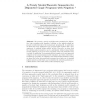Free Online Productivity Tools
i2Speak
i2Symbol
i2OCR
iTex2Img
iWeb2Print
iWeb2Shot
i2Type
iPdf2Split
iPdf2Merge
i2Bopomofo
i2Arabic
i2Style
i2Image
i2PDF
iLatex2Rtf
Sci2ools
115
click to vote
LPNMR
2007
Springer
2007
Springer
A Purely Model-Theoretic Semantics for Disjunctive Logic Programs with Negation
Abstract. We present a purely model-theoretic semantics for disjunctive logic programs with negation, building on the infinite-valued approach recently introduced for normal logic programs [9]. In particular, we show that every disjunctive logic program with negation has a nonempty set of minimal infinite-valued models. Moreover, we show that the infinite-valued semantics can be equivalently defined using Kripke models, allowing us to prove some properties of the new semantics more concisely. In particular, for programs without negation, the new approach collapses to the usual minimal model semantics, and when restricted to normal logic programs, it collapses to the well-founded semantics. Lastly, we show that every (propositional) program has a finite set of minimal infinite-valued models which can be identified by restricting attention to a finite subset of the truth values of the underlying logic.
| Added | 08 Jun 2010 |
| Updated | 08 Jun 2010 |
| Type | Conference |
| Year | 2007 |
| Where | LPNMR |
| Authors | Pedro Cabalar, David Pearce, Panos Rondogiannis, William W. Wadge |
Comments (0)

